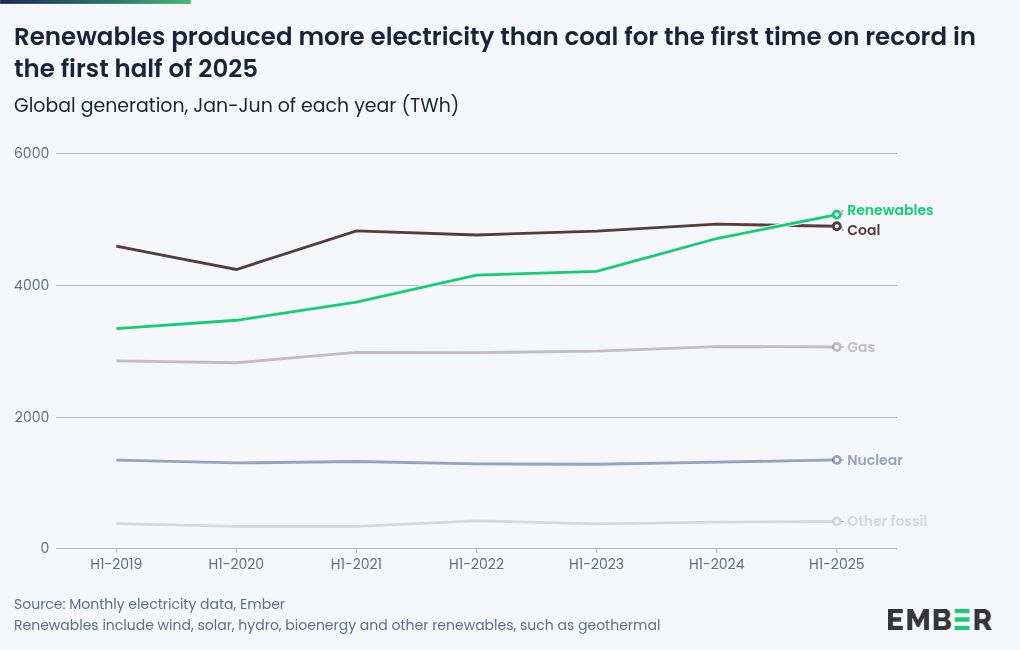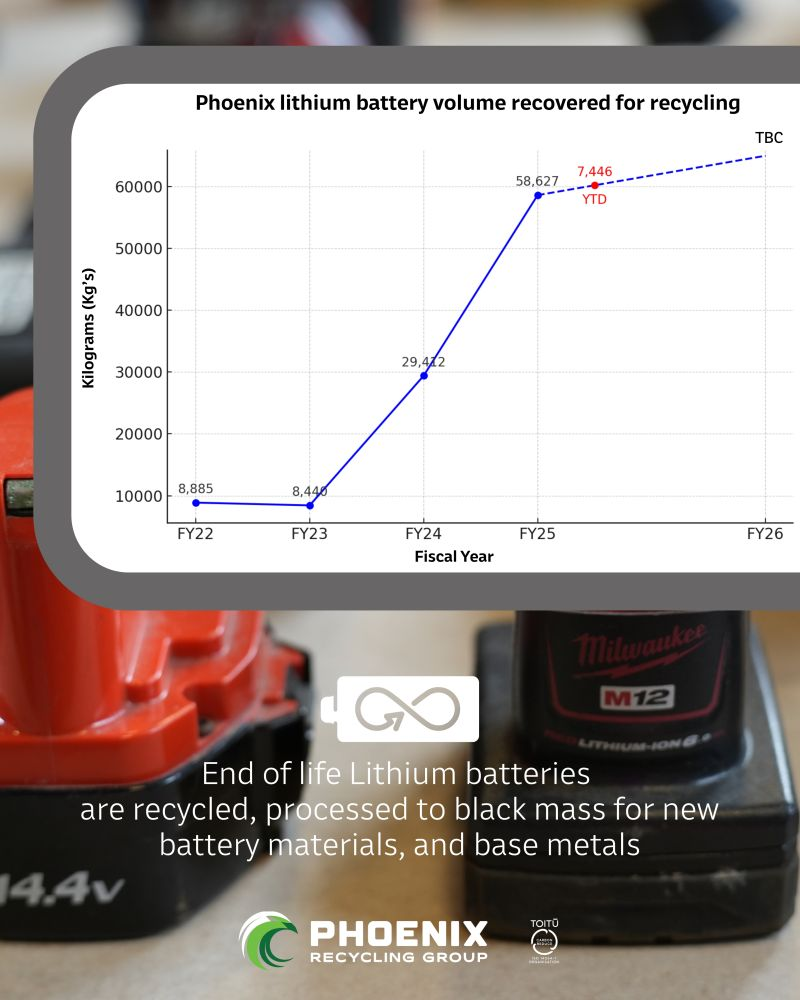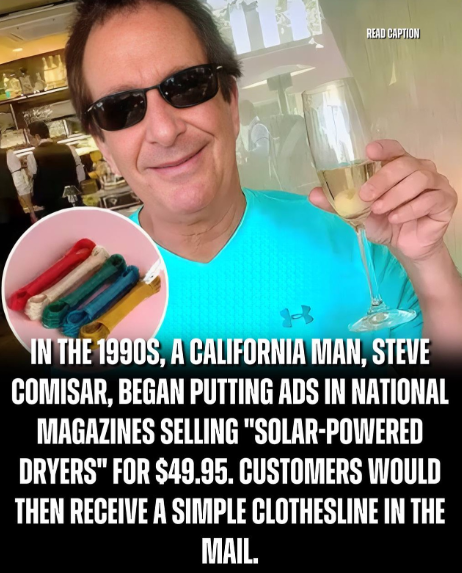The case for energy loans: read our latest explainer



Renewables take over from coal for electricity generation and wind and solar match the world's growth in demand; old EV batteries are proving popular; an Australian study shows that solar panels can make you money, not just save you money; take a trip on a luxury electric solar-powered houseboat in Africa; and the amazing 'solar powered clothes dryer'.

On the up
We love a good tipping point at Rewiring and we may have just experienced another one after a report from energy consultancy Ember showed that renewables overtook coal for electricity generation in the first half of year for the first time.

The BBC called it a historic first and said that the “growth in solar and wind was so strong it met 100% of the extra electricity demand, even helping drive a slight decline in coal and gas use.”

Solar power delivered the lion's share of growth, meeting 83% of the increase in electricity demand. It has now been the largest source of new electricity globally for three years in a row.
There are differences between regions, of course, and the US and EU increased their use of fossil fuels to meet higher electricity demand.
Most solar generation (58%) is now in lower-income countries, many of which have seen explosive growth in recent years. That's thanks to spectacular reductions in cost. Solar has seen prices fall a staggering 99.9% since 1975 and is now so cheap that large markets for solar can emerge in a country in the space of a single year, especially where grid electricity is expensive and unreliable, says Ember.
Senior Electricity Analyst Małgorzata Wiatros-Motyka says:
We are seeing the first signs of a crucial turning point. Solar and wind are now growing fast enough to meet the world’s growing appetite for electricity. This marks the beginning of a shift where clean power is keeping pace with demand growth. As costs of technologies continue to fall, now is the perfect moment to embrace the economic, social and health benefits that come with increased solar, wind and batteries.
Wouldn’t it be nice to see a bit more focus on solar in New Zealand (and less focus on expensive, imported LNG) especially given the role it can play in keeping our hydro lakes full in the critical late summer and autumn period.
The circle of life
We’ve said it before and we’ll say it again: electrification is a massive opportunity for a more circular economy. And that can be seen in the growing demand for old EV batteries.
When old EV batteries (many of them from early Nissan Leafs, which degrade far more quickly than more modern EVs) stop being useful for driving, they are still good for other things.
As the story in the Guardian says:
“Written-off vehicles typically earn little attention, with the main buyers usually being auto wreckers seeking parts or car enthusiasts hunting for restoration projects.
But at salvage auctions across Australia, a new type of buyer is emerging, and they are interested in one thing: the high-powered batteries inside electric vehicles.
The demand for secondhand EV batteries is surging, with buyers repurposing them for everything from solar storage units to off-grid energy systems that can replace diesel generators.”



Overseas, old EV batteries have been used by recycling firm Redwood Materials to power a small data centre and the founder JB Straubel has said in the past that batteries and other materials used in EVs, solar panels and electric machines are not just used and replenished like fossil fuels, they are a strategic asset.
The Rocky Mountain Institute published a report on how EV battery recycling can address a critical gap in the supply chain.
And if you’ve ever wanted to see what a battery recycling place looks like, here’s a clip from a company that salvages batteries - maybe from prangs, maybe from people who are upgrading - and sells them on.
Locally, while it’s not just recycling EV batteries, Phoenix says it is rapidly increasing its lithium recovery.
In just three years, we’ve grown from recovering 8.8 tonnes of lithium batteries in FY22 to an expected 65+ tonnes in FY26 — a 7x increase.

Selling the sizzle
Solar is working at the macro level, and it also works at the micro level - in a few different ways. It reduces your bills significantly, improves resilience and makes for an excellent replacement for petrol if you’re running an EV. But there might be one more: it can also increase the value of your home.
Property company Cotality recently released a study in Australia looking at the difference between homes with and without solar and, in addition to saving you far more money than it costs over the long-term, purchasing rooftop solar was shown to add $23,000 to the average property’s value.
Homes with solar power systems are valued at around 2.7% more than comparable homes without.
Our findings highlight that homes with energy and efficiency upgrades are delivering not only long-term energy bill savings and comfort, but also measurable price premiums at a time when cost-of-living concerns are top of mind for Australians,” said Tom Coad, Senior Director, Banking and Finance at Cotality Australia.
While $20,000 worth of solar panels is unlikely to be the main consideration for someone buying a $1m home, a number of studies have shown a correlation between panels and higher property prices. Perhaps more importantly, it may give those who aren’t sure how long they’ll be there the confidence to invest because they’ll get some of it back when they sell.
Floating assets
Electric boats are on the rise, but the Pangolin Explorer is another step up because this luxury African houseboat is solar-powered.
As the Everything Electric Show says:
“This 35-metre floating hotel can house 20 people and runs entirely on sunshine, powered by 80 solar panels and 240 kWh of onboard batteries. With zero emissions and silent operation, it enables ridiculous proximity to wildlife.”
When it comes to experiencing nature by boat, fossil fuel machines have got us to many remote places, but they’re not ideal. They’re loud and smelly and a diesel trail in the water is not great for the wildlife. That’s why clean tech is so important in this space, and why tourism companies can lead the way.
God loves a drier
We’re pro-solar and anti-scam here at Rewiring, but we did enjoy the story of Steve Comisar, who conned thousands of Americans out of $49.95 by selling "space aged solar powered clothes dryers."


Rewiring Aotearoa is in favour of universal Road User Charges as we believe it will address an artificial market distortion for vehicles that is not in New Zealand’s economic, fuel security, or resilience interests. Here's what we told the Select Committee.
Read moreDownload
The story of Uruguay's renewable push and why it's relevant here; EVs reach a tipping point in the EU, but they're growing in developing nations, too; Tauranga Crossing and Endless Energy go vertical with a new solar install; new research shows panels keep on trucking far past their warranty periods; and if you need a hand getting out on the waves, how about getting your own electric towing machine.
Read moreDownload
Our Political Power series aims to show that going electric is good for everyone, no matter where you sit on the political sprectrum. Whether you're looking to lower costs, reduce emissions or increase resilience, it increasingly makes sense at an individual, community and country level and ACT's Todd Stephenson, who bought an electric Jeep around one year ago and built his new home in Queenstown to run on electrons, is a good example of that.
Read moreDownload